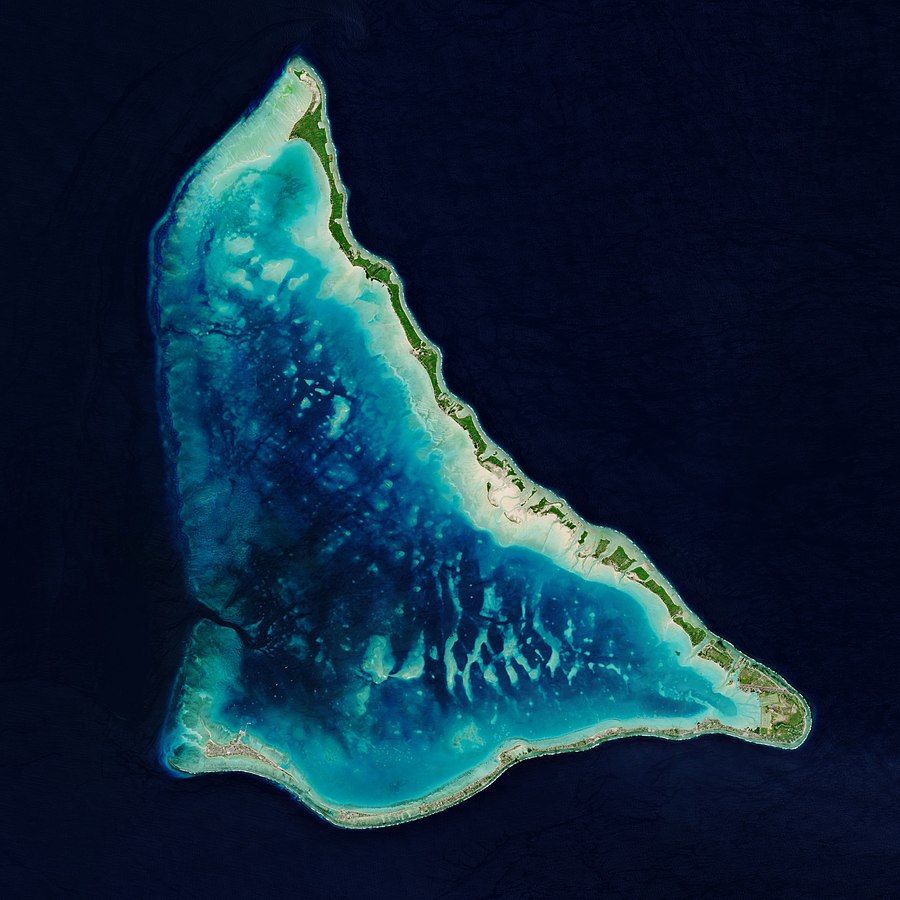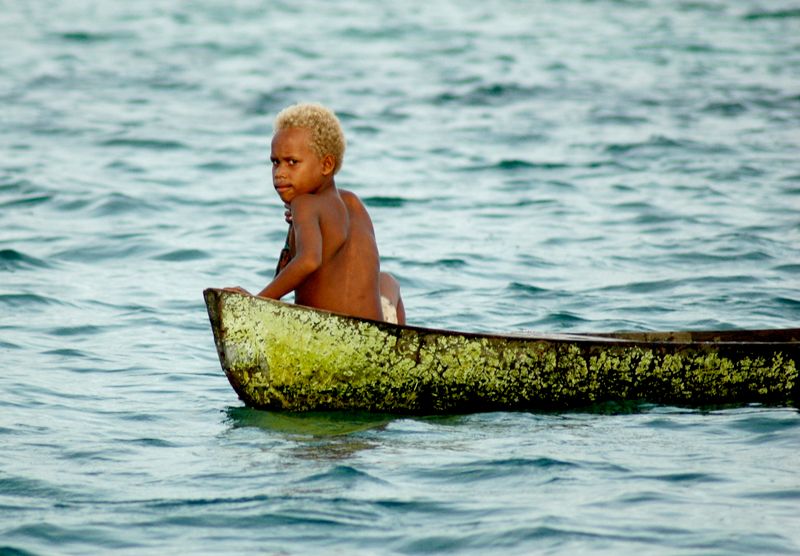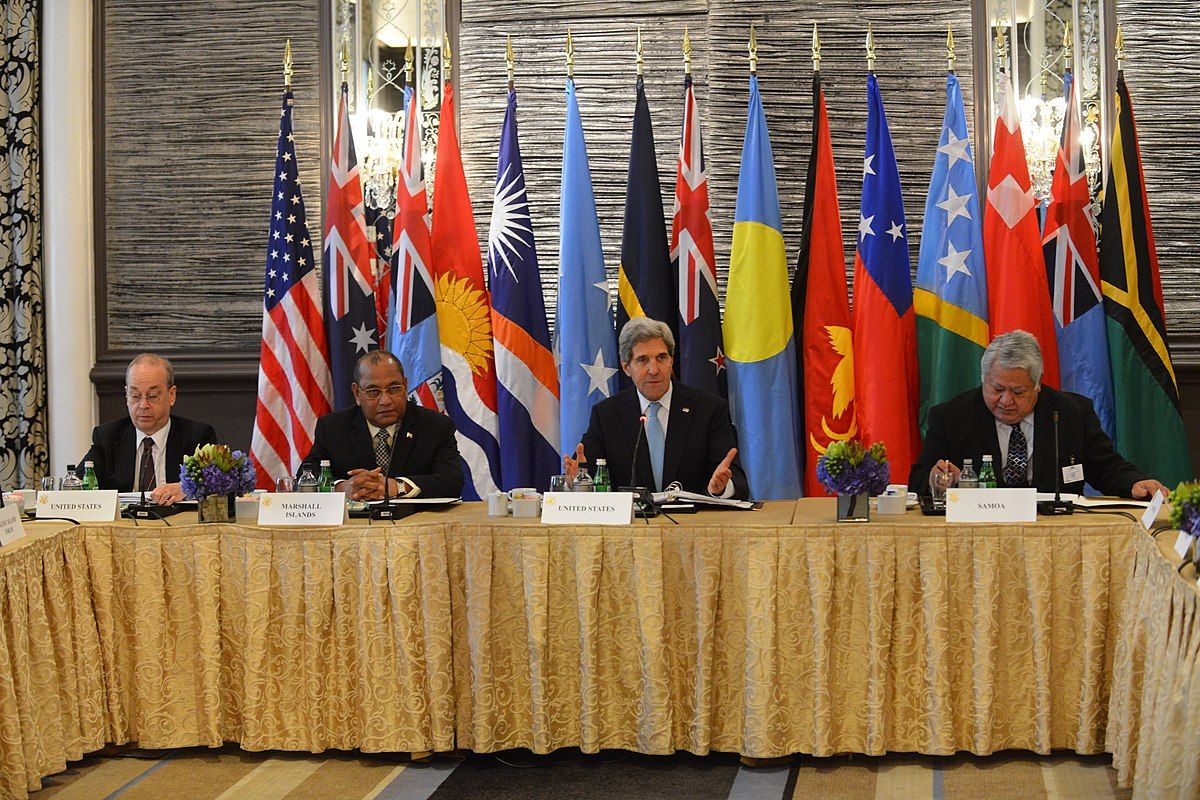In August 2020, China’s ambassador to the Pacific island nation of Kiribati raised a great deal of controversy when he literally walked on the backs of a line of islanders. The United States and its allies strongly condemned the scenario. “I simply cannot imagine any scenario in which walking on the backs of children is acceptable behaviour by an ambassador of any country,” wrote Constantine Panayiotou, the US defense attaché to Kiribati, on Twitter.
But the Chinese saw matters differently. The ambassador, Tang Songgen, claimed that the locals had merely shown him deference according to their own cultural traditions. China’s state-owned newspaper, the Global Times, stepped up the rhetoric further. “Portraying the welcome ceremony as being symbolic of ‘subjugation’ reflects some Western politicians’ grievances and concerns over the growing friendship between China and Kiribati,” the newspaper sniffed.
This incident was a microcosm of the geopolitical tensions currently at play in the Pacific. As China has increasingly turned its attention to the Pacific island states, the United States and its allies have not followed suit. With the recent discord within the Pacific Islands Forum, though, the Biden administration has the perfect opportunity to establish the United States as a diplomatic partner for the region and a counterweight to China.
China, Taiwan, and the Pacific
There are 14 sovereign nations in the Pacific with nearly 15 million people between them, divided into three large groups: Micronesia, Melanesia, and Polynesia. Micronesia mainly consists of small coral atolls in the western parts of Oceania north of the Equator; Melanesian islands are south of the Equator but north of Australia; and Polynesian islands are in the center and eastern parts of the Pacific. In World War II, these islands achieved great strategic importance as Chester Nimitz pursued his “island hopping” strategy to get closer to the Japanese mainland. Indeed, the Marine Corps’ invasion of Iwo Jima in this campaign achieved legendary status.
Recently, the Pacific islands have gained more attention internationally with their focus on climate change diplomacy. In particular, these island states have established a strong bloc within the United Nations to push for more stringent action on this subject. Since each member state gets one vote in the United Nations regardless of size, they can certainly punch above their weight in international fora like the General Assembly.
Although influence in the United Nations is certainly on China’s mind as it expands its presence in the Pacific, another state closer to home represents a higher geopolitical priority: Taiwan. Since six out of the 18 countries that formally recognized Taiwan in 2018 were located in the Pacific, China launched a strong influence campaign there to persuade those nations to switch diplomatic allegiance. After all, losing any one of the few countries that recognized Taiwan would harm Taiwan’s claim for full sovereignty.
When Kiribati and the Solomon Islands both decided to switch relations over to mainland China within the span of two weeks in September 2019, Taiwan suffered a major blow. Indeed, Taiwan’s foreign minister accused China of “luring” Kiribati into the fold with promises of development loans, ferries, and even a Boeing 737 jetliner to switch sides. With the moves, he charged China with intending to “suppress and reduce Taiwan’s international presence.”

Of course, China’s efforts to woo the Solomon Islands did not win over everybody. Opposition leaders accused China of bribing congresspeople to support the switch, while the island of Malaita has vehemently opposed the switch. Meanwhile, a Chinese company’s attempt to lease the Tulagi island, which hosts a coveted deep-water harbor that could serve military uses, met such vehement opposition that the Solomon Islands nixed the deal in October 2019, a month after the parties originally inked the contract.
Around the same time, the United States scored another small victory when the government of Bougainville, an island currently part of Papua New Guinea, asked the US government to step in to fund a referendum on independence. In part, this signaled that Bougainville leaders trusted the United States to help conduct this referendum, rather than inviting China to support its process. “It’s just that the invitation never arrived, or, rather, was never sent,” an anonymous source explained to Reuters.
Even though Bougainville later voted for independence, it has not signaled whether it will side with China or Taiwan. In this sense, the referendum’s result merely kicked the can down the road until independence negotiations conclude. This contrasted with China’s forays into Papua New Guinea itself, especially through the construction of new fiber optic cables that nonetheless failed to offer the promised benefits.
The diplomatic battle between Taiwan and China played out several months later in Kiribati as the two presidential candidates took differing sides in presidential elections held in June 2020. Taneti Maamau, the incumbent president, ran on a platform of closer ties with China. His rival, Benuera Berina, opposed the decision to cut relations with Taiwan, questioning China’s practices of “debt-trap diplomacy.” Indeed, Berina felt so strongly about the issue that he had resigned from Maamau’s cabinet over the issue.
Early signs pointed to a victory for Berina. Parliamentary elections in April delivered a slim victory to parties opposing greater ties with China. In the end, however, voters did not buy Berina’s skepticism over increased Chinese development aid, as they delivered a resounding victory to Maamau by a vote of 26,053 to 17,866. With that victory, Kiribati unlocked hundreds of millions of dollars in Chinese aid as Maamau promised to resist undue Chinese interest in I-Kiribati affairs. China also opened an embassy in Tarawa shortly before the vote, as a part of China’s overall campaign to signify its growing diplomatic influence.
With Maamau’s victory, the United States worried about the geopolitical threat that the increased Chinese presence in I-Kiribati waters would pose. In particular, US military officials worried that the Chinese proposal to build a port on Kiritimati, only 1,300 miles from Hawaii, would put Chinese warships within striking distance of military bases throughout the Hawaiian archipelago. China had also expressed interest in reviving a mothballed space tracking station in the country, which would give China a more advantageous look at US missile trajectories. It is important to note that neither idea has come to fruition, so US worries are just speculation at this point.
More broadly, US officials and their allies in Australia and New Zealand fear that the Solomon Islands and Kiribati are falling victim to China’s so-called “debt trap diplomacy.” Through increasing corruption and elite capture, debt trap diplomacy undermines the governments that Western donors have fought to support. Diplomatically, the United States fears that debt trap diplomacy will lead to increased pressure for Pacific island states to vote with China in the United Nations on issues such as China’s position in the South China Sea.
Vaccine Diplomacy, Island Style
With the onset of the COVID-19 pandemic, another kind of diplomacy has taken root: coronavirus diplomacy. China got an early win when 10 Pacific island nations praised China’s initial COVID response in May 2020, as they celebrated China’s “open, transparent, and responsible approach in adopting timely and robust response measures.” As this public statement came at a time when other world powers criticized China’s initial response, it gave China a small diplomatic victory. However, things went downhill from there.
An early incident occurred in the Solomon Islands. In June, Malaita Province, which had strongly opposed the decision to break relations with Taiwan, sought personal protective equipment from Taiwan. After Malaita publicly thanked Taiwan for sending this aid, both China and the Solomon Islands’ central government published angry responses, since the move had clearly undermined China’s position in relation with the Solomon Islands.

China’s COVID diplomacy has been equally unsuccessful in other Pacific states. Taiwan publicized its mask and Personal Protective Equipment (PPE) donations to Tuvalu, Nauru, the Marshall Islands, and Palau, and Australia and New Zealand have stepped up their efforts to provide assistance to Pacific island states. In particular, Pacific island states have welcomed these efforts, not only for the sheer volume of aid (which easily exceeds China’s) but also for their focus on rebuilding economies in the long run. This clearly contrasts with China’s short-term approach which has emphasized diplomatic brownie points over substantial aid.
In Papua New Guinea, China suffered a series of setbacks related to its COVID aid. Previously, Papua New Guinea had turned to Australia after Chinese bureaucratic politics delayed a loan for critical infrastructure, while Australia had successfully blocked a bid by Huawei to lay undersea cable to the Solomon Islands. COVID made things worse for China as Papua New Guinean leaders grumbled at China’s “pro forma” PPE donations; at one point, Papua New Guinea refused entry to a planeload of Chinese workers because they had participated in a vaccine trial that the government had not approved.
In the midst of the general failure of China’s COVID diplomacy in the Pacific, regional elections have dealt it further setbacks. In particular, Palau’s newly elected president Surangel Whipps stated he wishes to continue the country’s strong partnership with the United States, citing his country’s participation in Operation Warp Speed. “I think what it is really about is freedom and the exercise of democracy and many times, we feel big countries want to bully small countries. It’s important to have a strong partner that is there for us,” Whipps told the Guardian.
Discord in Paradise
As luck would have it, a failure of democracy led to the next major crisis facing the Pacific—and ironically, Palau led the charge. First, a little context is necessary. The Pacific Islands Forum (PIF), a representative body aimed to enhance cooperation among the Pacific island states and enhance their diplomatic prestige abroad, previously operated under a gentleman’s agreement that would see the position of Secretary General rotated among Micronesia, Melanesia, and Polynesia. But this year, Micronesia’s candidate lost to a candidate from Polynesia.
As a result, Palau withdrew from the Forum. “The process regarding the appointment of the secretary-general has clearly indicated to the Republic of Palau that unity, regionalism and the ‘Pacific Way’ no longer guide the forum,” said Whipps. Soon, Nauru, the Federated States of Micronesia, Kiribati, and the Marshall Islands quickly joined Palau in solidarity.
Although this crisis has nothing to do with the United States or China, both countries will feel its effects. Writing in The Hill, former NSC official Alexander Gray argued that “a PIF without Micronesian voices is likely to be one far less interested in US priorities and perspectives” since Micronesian states like Palau have vocally opposed China’s forays into the region.

However, this crisis could also turn into an opportunity for the United States to demonstrate its commitment to the Pacific region. If it uses its diplomatic influence to secure concessions in favor of Micronesia, as Gray suggests, the United States could revitalize the PIF. It will have to do more than that, though. First, it could generate goodwill among the Pacific countries by beating China at its own game of vaccine diplomacy, especially if the administration achieves its goal of vaccinating every American by July.
Second, it could match Australia and New Zealand’s aid efforts that promote long-term development, rather than just currying short-term diplomatic favor. This is critical, especially as these island countries face more difficulties in securing funding for adaptation efforts. Additionally, this could fit in with US efforts to establish a “Blue Dot Network” and directly fight against the Belt and Road’s expansion into the Pacific.
Finally, it could take climate change more seriously, as the Biden administration has signaled with its appointment of a climate czar; since these Pacific nations literally face extinction with sea level rise, pushing diplomatically for stronger climate provisions worldwide would certainly curry favor with them.
Of course, the United States should also avoid gaffes like the Chinese ambassador to Kiribati made. But avoiding gaffes is not nearly enough to win the Pacific over. It should invest much, much more in this neglected region before it is too late.
Cover photo credit: US Embassy New Zealand, public domain, accessed via Wikimedia Commons.




